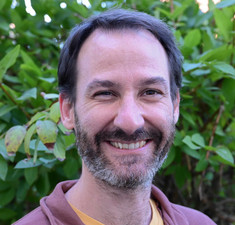Christoph Schunko, Assoz.Prof. Dipl.-Ing. Dr.
Christoph Schunko, Assoz.Prof. Dipl.-Ing. Dr.
Leiter: Arbeitsgruppe Wissenssysteme und Innovationen
Stellvertretender Leiter: Institut für Ökologischen Landbau
Department für Nachhaltige Agrarsysteme
Universität für Bodenkultur Wien
Gregor-Mendel-Strasse 33, 1180 Wien
Tel.: (+43)1/47654-93348
E-Mail: christoph.schunko(at)boku.ac.at
Wissenstransfer
Medienbeiträge
Vorträge
Hochschulschriften
Lehrveranstaltungen
ResearchGate
Google scholar
ORCID
Forschungsinteresse
Meine Forschung konzentriert sich auf Erfahrungswissen über Wildsammlung in der Biologischen Landwirtschaft, und darüber hinausgehend. Das beinhaltet unter anderem Forschung über
- Biokulturelle Diversität von Wildsammlung;
- Wertschöpfungsketten von Produkten aus (Bio-)Wildsammlung;
- Ökologische und sozio-politische Nachhaltigkeit von (Bio-)Wildsammlung;
- Inkulturnahme und Domestizierung von (Bio-)Wildpflanzen.
Dabei interessieren mich sowohl europäische als auch außereuropäische Regionen, ländliche, suburbane und urbane Gebiete sowie kommerzielle als auch nicht-kommerzielle Wildsammlung. Außerdem arbeite ich an der Weiterentwicklung von Forschungsansätzen und -methoden, unter anderem von partizipativer Forschung und Citizen Science.
Lebenslauf in Kürze
- 2023-laufend Assoz. Prof. am IFÖL / BOKU
- 2023-2023 Habilitation in Ethnobotanik an der BOKU
- 2021-2022 Forschungsaufenhalt am ICTA, Autonome Universität Barcelona (UAB), Spanien
- 2017-2023 Laufbahnstelle am IFÖL / BOKU
- 2014-2017 Universitätsassistent am IFÖL / BOKU
- 2012-2016 Dissertation an der BOKU
- 2012-2015 Projektmanagement und wissenschaftliche Synthese im EU FP7 finanzierten COMBIOSERVE Projekt am IFÖL / BOKU
- 2009-2011 Projektmitarbeiter am IFÖL / BOKU
- 2006-2009 Masterstudium Ökologische Landwirtschaft an der BOKU und Iowa State University (ISU), USA
- 2003-2006 Bachelorstudium Agrarwissenschaften an der BOKU und Ecole d’Ingénieurs de Purpan (EIP), Frankreich
Forschungsprojekte
Fertiggestellt
- Local Indicators of Climate Change Impacts: The Contribution of Local Knowledge to Climate Change Research – LICCI
- Sammeln essbarer Wildpflanzen in urbanen Räumen - Studie über ökologische und sozio-politische Nachhaltigkeit des Sammelns in Wien – UrbanWildFoods
- Wildsammlung in der Biologischen Landwirtschaft – BioWildSammlung
- Beurteilung der Effektivität von gemeinschaftlichen Managementstrategien für die Erhaltung biokultureller Diversität – COMBIOSERVE
- Monitoring des lokalen Erfahrungswissens über Agrarbiodiversität im Großen Walsertal – BioCultural Diversity Monitoring
- Weitergabe und Veränderung von Erfahrungswissen Tiroler Emigranten in Peru, Brasilien und Australien – Tyrol
Neue Publikationen
Schunko, C; Álvarez-Fernández, S; Benyei, P; Calvet-Mir, L; Junqueira, AB et al. (2024). Consistency in climate change impact reports among indigenous peoples and local communities depends on site contexts. NPJ climate action, 3:41. https://doi.org/10.1038/s44168-024-00124-2
Arancibia Alfaro, AV; Schunko, C; Callo-Concha, D (2024). Uncovering the Potential for the Sustainable Commercialization of Non-Timber Forest Products: Palm Fruits in Pando, Bolivia. Small-scale forestry. https://doi.org/10.1007/s11842-024-09562-6
Reyes-García, V., García-Del-Amo, D., Porcuna-Ferrer, A., Schlingmann, A., Abazeri, M. et al. (2024). Local studies provide a global perspective of the impacts of climate change on Indigenous Peoples and local communities. Sustainable Earth Reviews, 7:1. https://doi.org/10.1186/s42055-023-00063-6
Reyes-García, V., García-del-Amo, D., Álvarez-Fernández, S., Benyei, P., Calvet-Mir, L., et al. (2024). Indigenous Peoples and local communities report ongoing and widespread climate change impacts on local social-ecological systems. Communications Earth & Environment, 5:29. https://doi.org/10.1038/s43247-023-01164-y
Fuchs, A., Vogl C.R., Schunko, C. (2024). Counteracting land abandonment: local adaptation strategies to climate change impacts of alpine farmers in Eastern Tyrol, Austria. In Reyes-García, V. et al: Routledge Handbook of Climate Change Impacts on Indigenous Peoples and Local Communities, Chapter 17. Routledge: Oxon, New York.
Molnár, Z., Fernández-Llamazares, Á., Schunko, C., Teixidor-Toneu, I., Jarić, I., Díaz-Reviriego, I., Ivascu, C., Babai, D., Sáfián, L., Karlsen, P., Dai, H., & Hill, R. (2023). Social justice for traditional knowledge holders will help conserve Europe’s nature. Biological Conservation, 285, 110190. doi.org/10.1016/j.biocon.2023.110190

